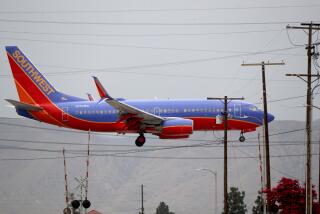Executive Travel : Survey Finds Firms Closely Scrutinizing Employees’ Spending
- Share via
As companies try to keep business travel spending in check, corporate travel policies are becoming increasingly restrictive, according to an American Express survey released this week.
The biennial survey of more than 1,700 companies shows that although two-thirds have increased their travel budgets, they are spending less per employee.
Travel and entertainment “is the third-largest controllable expense behind salaries and data-processing costs. Therefore, smart management of T&E; costs can significantly impact the bottom line,” said Roger Ballou, president of American Express Travel Services Group.
According to the survey, spending per traveling employee was $2,484 in 1993, compared to $3,113 in 1991. The ratio of business travelers to total employees also dropped. In 1991, 28% of all employees took at least one business trip a year, compared to 21% last year.
“I think we are seeing a trend toward tightening up,” said Valerie Estep, vice president of Topaz Enterprises Inc., a travel management consulting firm in Portland, Ore.
For example, many firms are restricting the classes of service they will authorize for overseas flights. Executives who used to fly first class are now flying business class, and those who flew business are now going coach, she said. “That trend is also carrying over into domestic travel.”
*
The percentage of employees allowed to fly first class on international flights decreased from 4% in 1991 to 3% in 1993, the survey shows, and the percentage allowed to fly first class on long domestic flights fell from 3% in 1991 to 2% in 1993.
Cora Wen, travel manager for clothing company Bugle Boy Industries in Simi Valley and a director of the Los Angeles Business Travel Assn., said her company is part of the trend. A new, more restrictive policy stipulates that the company will no longer pay business-class fares on domestic flights, she said. “We’re only using (frequent-flier) upgrades, which is a great savings for the company.”
The company is also sending fewer people on trips, and those who do travel do so less frequently, she said.
More companies are asking employees to book flights with the lowest available fares and to take advantage of deals even if they mean restrictions such as Saturday night stays, Ballou said.
Companies are also saving by requiring a wider latitude of arrival and departure times to take advantage of lower fares. For example, instead of searching for the lowest possible fare within one hour of when the traveler wants to leave and return, travel managers are asked to search for the lowest fare within a two-hour window.
“That gives you more flight options and can save money,” Estep said.
She also said there is less use of nonstop flights when they would cost more.
Among the American Express findings was evidence of the growth in international business. Private sector companies spent 13% of their travel and entertainment dollars overseas, up from 10% in 1991 and 8% in 1989. And more than 40% of private-sector companies in the survey operated business units abroad, up from 35% in 1991.
*
As for lodging, an increasing number of companies have started dictating where their employees can stay, preferring to have them booked into chains with which the company has negotiated rates, Ballou said. In 1989, 42% of companies required travelers to stay at certain hotels. Last year, the figure was more than 60%.
Car rentals have also come under closer scrutiny, the survey shows, with 79% limiting the size of cars employees can rent. Nearly two-thirds (63%) expected employees to refuel the cars before returning them, and 73% expected employees to refuse the additional charge for insurance.
To implement these types of cost controls, companies are coordinating their travel planning through a single agency or office. According to the survey, 73% of companies made all their travel arrangements through a single agency in 1993, up from 68% in 1991 and 51% in 1987.
Bugle Boy, for instance, now requires its employees to book all car, hotel and air travel arrangements through its corporate travel office so the company can take advantage of corporate discount rates with hotels and car rental chains, Wen said. “A $20 savings may not seem like much, but multiplied by 100 travelers times several trips a month--it does add up.”
*
Centralized booking also helps the travel department track expenses and keep tabs on employee travel patterns, she said.
“The bottom line is companies are not doing as well as they were in the 1980s,” Wen said. “Everybody is looking for ways to streamline. We’re not putting them in Motel 6s, but then again, we’re not putting them in the Ritz-Carltons, either.”
More to Read
Sign up for The Wild
We’ll help you find the best places to hike, bike and run, as well as the perfect silent spots for meditation and yoga.
You may occasionally receive promotional content from the Los Angeles Times.






